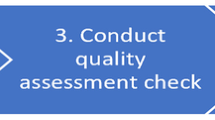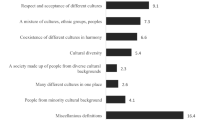Abstract
As a new approach to city management and the most important axis of the smart city, smart governance covers providing desirable citizen services through smart infrastructures. Smart management of the modern cities with high number of cultural diversities and differences wouldn’t happen except through focusing on the important concepts and infrastructures as a necessary factor. In this context, cultural intelligence is one of the most important skills we can apply in multicultural situations. Acquiring this skill, urban managers understand various cultural components quickly and correctly and behave appropriately in all situations. Therefore, this research aims to recognize the effects of cultural intelligence and smart governance in multicultural cities and, finally, provide appropriate scenarios for the smart management of urban culture. In this regards, the indexes and main variables of the research were identified by the Delphi method through a questionnaire; then, the data were analyzed using the Micmac software and scenario building based on the Schwartz method. The results show that in the first scenario, smart governance and management of urban culture are not realized; in the second scenario, this is somehow realized; and eventually in the third scenario, smart governance and management of urban culture is achieved appropriately.






Similar content being viewed by others
References
AGLBR (Analysts Group of the London Borough of Richmond upon Thames). (2013). London borough of Richmond upon thames census borough profile, data rich. LONDON DATASTORE. https://data.london.gov.uk.
Airaksinen, M., Porkka, J., Vainio, T., Huovila, A., Hukkalainen, M., Ahvenniemi, H., Rämä, P., & Pinto-Seppä, I. (2016). Research Roadmap Report Smart City Vision. International council for research and innovation in Building and Construction. ISBN 978-90-6363-093-5.
AlAwadhi, S., & Scholl, H. J., (2016). Smart governance: A cross-case analysis of smart city initiatives. In Proceedings of the 49th Hawaii international conference on system sciences (HICSS-48), Poipu, Kauai, HI (pp. 2953–2963).
Allam, Z., & Newman, P. (2018). Redefining the smart city:Culture,metabolism and governance.smart cities. https://doi.org/10.3390/smartcities1010002. www.mdpi.com/journal/smartcities.
Ang, S., Van Dyne, L., & Koh, C. (2006). Personality correlates of the four-factor model of cultural intelligence. Group and Organization Management, 31(1), 100–123.
Ang, S., Van Dyne, L., Koh, C., Yee Ng, K., Templer, K. J., Tay, C., et al. (2007). Cultural intelligence: Its measurement and effects on cultural judgment and decision making, cultural adaptation and task performance. Management and Organization Review, 3(3), 335–371.
Anthopoulos, L., & Reddick, C. G. (2016) Smart city and smart government: Synonymous or complementary? In WWW’16 companion, April 11–15, 2016, Montréal, Québec, Canada. ACM 978-1-4503-4144-8/16/04.
Azkuna, I. (2012) Smart Cities Study: International study on the situation of ICT, innovation and knowledge in cities. The Committee of Digital and Knowledge-based Cities of UCLG Chaired by Iñaki Azkuna, Mayor of the City of Bilbao Bilbao
Barber, B. (1997). The new telecommunication technology: Endless frontier or the end of democracy. Constellations, 4, 208–228.
Bekkers, V.J.J.M., & Homburg, V.M.F. (eds.) (2007). The information Ecology of E-Government. Amsterdam, the Netherlands: IOS Press.
Brown, K. W., & Ryan, R. M. (2003). The benefits of being present: Mindfulness and its role in psychological well-being. Journal of Personality and Social Psychology, 84(4), 822.
Castelnovo, W. (2016). Co-production Makers cities smarter: Citizens' participation in smart city initiatives. Springer. https://doi.org/10.1007/978-3-319-30558-5-7.
Central Policy Unit. (2015). Hong Kong Special Administrative Region Government.
Cooper, B., & Rawat, D. S. (2016). Cyber security: A necessary pillar of smart cities 2016. Lund: Department of Informatics, Lund School of Economics and Management Lund University.
Dangmei, J. (2016). Cultural intelligence: Bridging the cultural differences in the emerging markets. Research Scholar, Department of Business Management (DoBM) Indira Gandhi National Tribal University (IGNTU), Amarkantak.
Davoudi, S., & Zonneveld, W. (2012). Amsterdam: A multicultural capital of culture, Chapter: 11. In H. K. Anheier & Y. R. Isar (Eds.), Cities, cultural policy and governance (Vol. 5, pp. 292–310)., The cultures and globalization series Thousand Oaks: Sage Publication. https://doi.org/10.4135/9781446254523.n11.
Earley, P. C., & Ang, S. (2003). Cultural intelligence: Individual interactions across cultures. Palo Alto: Stanford University Press.
Ersoy, A. (2014). The role of cultural intelligence in cross-cultural leadership effectiveness: A qualitative study in the hospitality industry. Journal of Yasar University, 9(35), 6099–6260.
European Parliament. (2014). Mapping smart cities in the EU. To contact Policy Department A or to subscribe to its newsletter please write to: Poldep-Economy-Science@ep.europa.eu Manuscript completed in January 2014© European Union, 2014. This document is available on the Internet at: http://www.europarl.europa.eu/studies.
Ferraro, S. (2013). Smart cities, analysis of a strategic plan. Master thesis, Alma Master studiorum-universita bologna. https://amslaurea.unibo.it.
Gardner, H. (2006). Multiple intelligences new Horizons in theory and practice. Basic Books. Reprint edn., as a catalyst.
Giffinger, R., Fertner, C., Kramar, H., Kalasek, R., Pichler-Milanović, N., & Meijers, E. (2007). Smart cities: Ranking of European medium-sized cities. Vienna: Centre of Regional Science - Vienna UT.
Giuffrè, T., Marco Siniscalchia, S., & Tesorierea, G. (2012). A novel architecture of parking management forsmart cities. Procedia Social and Behavioral Sciences, 53, 16–28.
Greater London Authorithy. (2018). Smarter London together. www.london.gov.uk/smart-london.
Hampden-turner, C., & Trompenaars, F. (2006). Cultural intelligence: Is such a capacity credible? Sage journals, Group & Organization Management, 31(1), 56–63. https://doi.org/10.1177/1059601105276942.
Homburg, V. (2008). Understanding E-Government, Information Systems in Public Administration. Albingdon, Oxon: Routledge.
Jansen, D., Rotthier, S., & Snijkers, K. (2004). If you measure it they will score: An assessment of international eGvernment benchmarking. Information Polity, 9(2), 121–130.
Kettani, D., Gurstein, M., & Mahdi, A. E. (2009). Good governance and e-government: Applying a formal outcome analysis methodology in a developing world context. International Journal of Electronic Governance, 2(1), 21–54. https://doi.org/10.1504/JEG.2009.024963.
Koh, T. (2004). Speech on Singapore: Multiculturalism’s success story at Royal Garden Hotel London on September Thursday 16, 2004.
Kumar, N., Rose, R. C., & Subramaniam, R. (2008). The effects of personality and cultural intelligence on international assignment effectiveness: A review. Journal of Social Science, 4(4), 320–328.
Lazaroiu, G.C., & Roscia, M. (2012). Definition methodology for the smart cities model. Energy 47(1), 326–332. https://doi.org/10.1016/j.energy.2012.09.028.
Livermore, D. (2011). The cultural intelligence difference. New York: American Management Association.
Livermore, D., & Van Dyne, L. (2016). cultural intelligence the essential intelligence for the 21st century. Alexandria: SHRM Foundation.
Lombardi, P.L., Giordano,S., Farouh, H., & Yousef, W. (2012). Modelling the smart city performance. Innovation: The European Journal of Social Science Research. https://doi.org/10.1080/13511610.2012.660325.
Manville, C., Cochrane, G., Cave, J., Millard, J., Pederson, J.K., Thaarup, R.K., & Kotterink, B. (2014). Mapping smart city in the EU. European Parliament. Accessed at: http://www.europarl.europa.eu.
Meijer, A. (2016). Smart city governance: A local emergent perspective. In J. R. Gil-Garcia et al. (Eds.), Smarter as the New Urban Agenda A Comprehensive Viewof the 21st Century City, Public Administration and Information Technology (vol. 11). Switzerland: Springer. https://doi.org/10.1007/978-3-319-17620-8_4.
Ministeriet for Videnskab Tecknology og Udvikling. (2000). Digital Denmark-conversion to the network society. Copenhagen: Ministeriet for Videnskab Tecknology og Udvikling.
Mohr, J. W. (2007) Cultural intelligence. http://www.c-suitefuture.com/sites/c-suitefuture.com/files/Cultural_Intelligence(Van%20Dyne,Ang,&Nielsen-07').pdf.
Mooij, J. (2003). Smart governance? Politics in the policy process in Andhra Pradesh, India. In Working and Discussion papers, overseas. Westminster Bridge Road, London, UK: Development Institute.
Musterd, S., & Cornelis Deurloo, R. (2006). Amsterdam and the preconditions for a creative knowledge city. TESG: Tijdschrift voor Economische en Sociale Geografie, 97(1), 80–94. https://doi.org/10.1111/J.1467-9663.2006.00498.x.
Mutiara, D., Yuniarti, S., & Pratama, B. (2018). Smart governance for smart city. Earth and Environmental Science. https://doi.org/10.1088/1755-1315/126/1/012073.
Nam, T., & Parda, T. (2011). Conceptualizing smart city with dimensins of technology, people, and institutions. In The proceedings of the 12th annual international conference on digital government research.
Noor, N., & Leong, C. H. (2013). Multiculturalism in Malaysia and Singapore: Contesting models. International Journal of Intercultural Relations, 37(6), 714–726. https://doi.org/10.1016/j.ijintrel.2013.09.009.
Odendaal, N. (2003). Information and communication technology and local governance: Understanding the difference between cities in developed and emerging economies. Computers, Environment and Urban Systems, 27(6), 585–607.
Pereira, G. V., Parycek, P., Falco, E., & Kleinhans, R. (2018). Smart governance in the context of smart cities: A literature review. Information Polity, 23(2), 1–20. https://doi.org/10.3233/IP-170067.
Peterson, B. (2004). Cultural intelligence: A guide to working with people from othercultures. Yarmouth, ME: Intercultural Press.
Purnomo, M. H. P. F. (2016). Smart city indicators: A systematic literature review. Journal of Telecommunication Electronic and Computer Engineering (JTEC), 8(3), 161–164.
Scholl, H.J., & Scholl, M.C. (2014). Smart governance: A roadmap for research and practice. In iConference. https://doi.org/10.9776/14060.
Economic and Social Council. (2016). Smart cities and infrastructure. Commission on Science and Technology for Development Nineteenth Session Geneva, May 9–13, 2016 Item 3(a) of the provisional agenda.
Tapscott, D. (1995). The digital economy: Promise and peril in the age of networked intelligence. New York: McGraw-Hill.
Thomas, D.C., & Inkson, K. (2004). Cultural intelligence people skills for a global workplace. http://www.researchgate.net.
Thomas, D. C., & Inkson, K. C. (2009). Cultural intelligence: Living and working globally. San Francisoco: Berrett-Koehler Publishers. https://www.worldcat.org.
Troy, A. S., Shallcross, A. J., Davis, T. S., & Mauss, I. B. (2013). History of mindfulness-based cognitive therapy is associated with increased cognitive reappraisal ability. Mindfulness, 4(3), 213–222.
Tuncer, F. (2017). Smart governance for smart cities. In WTIS-17, Nov 16th 2017 Hammamet, Tunisia.
Van Dana, D. Z. (2017). Smart Nation Singapore, Kingdom of the Netherlands, Holland Innovation Network.www.rvo.nl.
Van Dyne, L., Ang, S., & Tan, M.L. (2017). Cultural intelligence. Oxford bibliographies. https://doi.org/10.1093/BOB/9780199846740-0115, www.oxfordbibliographies.com.
Vertovec, S. (2007). Super-diversity and its implications. Ethnic and Racial Studies, 30(6), 1024–1054.
Walravens, N. (2012). Mobile business and the smart city: Developing a business model framework to include public design parameters for mobile city services. Journal of Theoretical and Applied Electronic Commerce Research, 7(3), 121–135.
Willke, H. (2007a). Smart governance: Governing the global knowledge society. Frankfurt: Campus Verlag Gmbh.
Willke, H. (2007b). Smart governance: Governing the global knowledge society. New York: Campus Verlag.
Ziyatdinova, E. (2017). The role of cultural intelligence from the perspective of leader. ARCADA.
Author information
Authors and Affiliations
Corresponding author
Additional information
Publisher's Note
Springer Nature remains neutral with regard to jurisdictional claims in published maps and institutional affiliations.
Rights and permissions
About this article
Cite this article
Faraji, S.J., Jafari Nozar, M. & Arash, M. The analysis of smart governance scenarios of the urban culture in multicultural cities based on two concepts of “cultural intelligence” and “smart governance”. GeoJournal 86, 357–377 (2021). https://doi.org/10.1007/s10708-019-10074-6
Published:
Issue Date:
DOI: https://doi.org/10.1007/s10708-019-10074-6




